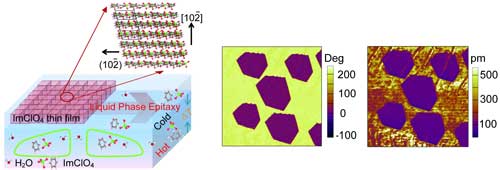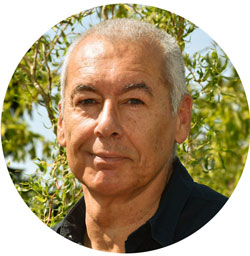| Posted: Aug 31, 2017 | |
Advancing molecular ferroelectric thin-film technologies |
|
| (Nanowerk Spotlight) Recent progress in molecular ferroelectrics (MOFEs) has been overshadowed by the lack of high quality thin-films for device integration. | |
| Molecular ferroelectrics are highly desirable as they are environmentally friendly, light-weight, and high spontaneous polarized. Though intensive studies have been focused on molecular ferroelectrics, very few researchers have tried to address the issue of thin film growth. | |
| A way to their controlled deposition on arbitrary supports in the form of thin-films will have to be found for practical applications, considering that both large-area solution processability and crystal flexibility are rather rare in of themselves, lagging behind of their inorganic oxide counterparts. | |
| Spin coating is a typical method for the film formation. This work proposes the liquid-phase growth technique, which facilitates the uniform film formation for extensive practical applications. The high quality ordered structure also helped the improvement of ferroelectric properties and device performances in electro-mechanical response, tunable electroresistance and electro-optic effect. | |
| Reporting their findings in Science Advances ("Tunable electroresistance and electro-optic effects of transparent molecular ferroelectrics"), an international research team now presents the first report on the preparation of high-quality large area MOFE films using in-plane liquid phase (IP-LP) growth. | |
 |
|
| Molecular ferroelectric thin films through in-plane liquid phase growth, exhibiting the pronounced ferroelectric performance with the Curie temperature ∼373 K. (Image: Dr. Z. Zhang and Mr. P. Li) (click on image to enlarge) | |
| With this approach, different kinds of novel ferroelectric films can be grown for potential practical applications such as temperature sensing, data storage, actuation, energy harvesting and storage. | |
| This generally applicable approach allows precise control of film thickness, roughness, homogeneity and crystal orientation by the solute concentration and growth environment, thereby enabling further studies to achieve orientation-controlled polarization and customizable ferroelectric properties for memory elements and sensors. | |
| "We have develped a water-based air-processable technique to prepare large-area MOFE thin films and devices, controlled by supersaturation growth at the liquid-air interface under a temperature gradient and external water partial pressure," Shenqiang Ren, an Associate Professor in the Mechanical Engineering at Temple University, tells Nanowerk. "Owning to its high spontaneous polarization, piezoelectric performance and high Curie temperature (~ 373 K) in the transparent ImClO4 thin-film, it shows remarkable novel electro-mechanical response, tunable electroresistance and linear electro-optic effect." | |
| This multidisciplinary work is the result of a collaboration between Ren's group, Prof. Ren-Gen Xiong (Southeast University, China) and Prof. Manfred Wuttig (University of Maryland, College Park, USA). | |
| "Our method for preparing MOFE thin-film is universal," Ren points out. "Therefore, it can be used for preparing numerous kinds of molecular ferroelectric thin-films with high quality for temperature sensing, data storage, mechanical actuation, actuation, energy harvesting, energy storage, etc." | |
| Going forward, the team will continue work on ImClO4 MOFE thin film based devices to further improve the performance of data storage and energy transduction properties. | |
| In a next step, they will try to use this universal method to fabricate some other kinds of novel MOFE thin-film devices to extend the application area and improve the performance. | |
| "Molecular ferroelectrics should be air-stable, moisture-stable and non-corrosive for device applications – novel molecular ferroelectric materials should be explored to address the issues," concludes Ren. "We expect that someday the performance of molecular ferroelectric materials based devices can compete with traditional inorganic oxide devices." | |
 By
Michael
Berger
– Michael is author of three books by the Royal Society of Chemistry:
Nano-Society: Pushing the Boundaries of Technology,
Nanotechnology: The Future is Tiny, and
Nanoengineering: The Skills and Tools Making Technology Invisible
Copyright ©
Nanowerk LLC
By
Michael
Berger
– Michael is author of three books by the Royal Society of Chemistry:
Nano-Society: Pushing the Boundaries of Technology,
Nanotechnology: The Future is Tiny, and
Nanoengineering: The Skills and Tools Making Technology Invisible
Copyright ©
Nanowerk LLC
|
|
|
Become a Spotlight guest author! Join our large and growing group of guest contributors. Have you just published a scientific paper or have other exciting developments to share with the nanotechnology community? Here is how to publish on nanowerk.com. |
|
